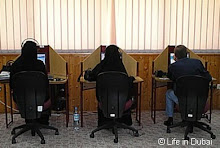There's an interesting development in the relationship between mainstream journalism and bloggers reported in Gulf News this morning.
Blogging has been, still is, much derided. A bunch of ignorant egotistical loonies ranting on, or sad people bearing their souls and giving us far too much personal information.
But it's gradually changing and people seem to be starting to accept us.
Gulf News has a full page on the State of the Press, the 'annual report on the evolution of press freedom'.
In it they report:
Bloggers and operators of cyber news sites, facing legal actions in the UAE, will become the first in the world to receive legal support from the Journalists' Association, provided they abide by the ethical and professional rules of the profession.
Mohammad Yousuf, secretary general of the association, told Gulf News the move came as a gesture from the association to improve the quality of blogging in the country and enhance the credibility of internet sites.
He said the association views the growing importance of blogging and cyber space as a "Fifth Estate" in the UAE and would like to ensure clean, credible and transparent environment of blogging activities in the UAE.
Surf around the blogosphere and you'll find just about everything it's possible to find. That includes the very personal diaries that were the origin of blogging, the keeping-in-touch-with-family blogs, mind-boggling extremist blogs of every persuasion, pornography blogs, comedy blogs. There are also plenty of news and opinion blogs.
Since I started blogging I've believed that those of us doing primarily news and op-ed blogs, although we're not trained journalists and we're not in the mainstream media, should keep laws and propriety in mind when we publish anything. After all, we put the stuff out there for anyone in the world with access to a computer to read.
'Life in Dubai' like many other blogs has links to it on several international mainstream media sites, is quoted in the mainstream media, is running at more than 12,000 visitors a month from around the world. That puts a responsibility on us. In those circumstances the laws of libel, for example, must surely apply to us as much as they do to the mainstream media.
Using that example, if we do libel someone we should expect to be treated the same as anyone in the media. But the other side of that coin is that I also think we should have the same protections as anyone else in the media.
I agree with what Mr Yousuf is reported as saying, except one small sentence.
Those who continue casting their views under vague identities will not be able to seek the association's help.
Using a nom de plume, such as Seabee, is not unusual or sinister and we each have our valid reasons for doing so. Many mainstream writers do the same and newspaper editorial writers are completely anonymous.
I've long believed that blogs can be a great source of information, can give the view from the street. In situations such as Gaza over the past three weeks, bloggers provide information and photographs which no-one else can.
Like all media you have to keep your brain in gear when you're reading the stories, don't blindly believe all you read, be aware of the perspective of the writer. Read a number of different blogs on a subject to get a broader perspective, just as you should with the mainstream media - imagine using Fox News as your only or main source of information!
If you're a blogger you should read the Gulf News story, which is here.
Tuesday, January 20, 2009
Subscribe to:
Post Comments (Atom)






2 comments:
Yes, snap again!
Good points - but I rather fear the UAE Journalists won't be rushing to the aid of Seabee's and alexanders - their website's only in Arabic, for instance.
And those 9 golden rules for bloggers remain elusive!
"Using a nom de plume, such as Seabee, is not unusual or sinister and we each have our valid reasons for doing so. Many mainstream writers do the same and newspaper editorial writers are completely anonymous."
Indeed. In fact, most editorials here in the US are not signed at all but are rather assumed to be written by the editor's collectively.
(Personally any editorial board that is in complete agreement on any issue is probably not a good one).
Post a Comment